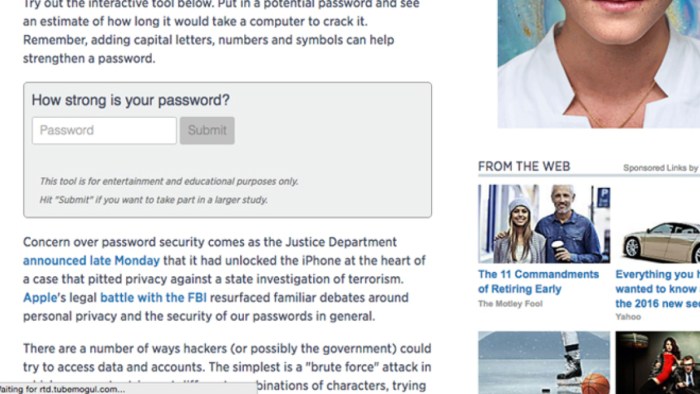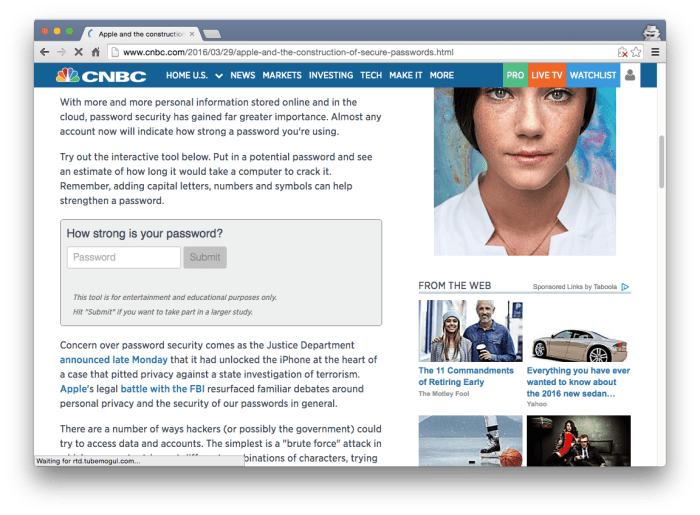Cnbcs password security exercise goes horribly wrong – CNBC’s password security exercise goes horribly wrong, highlighting the vulnerability of even large organizations to cyberattacks. This exercise, designed to test the strength of CNBC’s security measures, turned into a real-life nightmare when attackers exploited weaknesses in the company’s systems, leading to a significant data breach. The incident served as a stark reminder of the importance of robust security practices and employee awareness in today’s digital landscape.
The exercise involved simulating a realistic cyberattack scenario, where hackers attempted to gain unauthorized access to CNBC’s internal network and sensitive data. The attackers successfully exploited vulnerabilities in the company’s password security protocols, including weak passwords and a lack of multi-factor authentication. They were able to infiltrate the system through a combination of phishing attacks, brute force techniques, and social engineering tactics.
The Security Exercise: Cnbcs Password Security Exercise Goes Horribly Wrong
The CNBC password security exercise was a simulated attack designed to expose vulnerabilities in the company’s security systems and highlight the importance of strong password practices. The exercise involved a team of ethical hackers tasked with breaching CNBC’s security infrastructure using various attack techniques.
Vulnerabilities Exploited
The exercise revealed several vulnerabilities within CNBC’s systems, including:
- Weak passwords: Many employees used easily guessable passwords, such as common words or personal information. This made it easy for attackers to compromise accounts through brute force attacks.
- Lack of multi-factor authentication: The absence of multi-factor authentication allowed attackers to bypass security measures and gain unauthorized access to sensitive data. This was especially true for employees who used the same password for multiple accounts, which allowed attackers to leverage compromised credentials for further exploitation.
- Phishing vulnerabilities: Employees were susceptible to phishing attacks, where attackers sent emails that appeared legitimate but contained malicious links or attachments. These attacks successfully tricked employees into revealing their login credentials or downloading malware, providing attackers with a foothold within the company’s network.
Attack Techniques Used
The ethical hackers used various attack techniques to exploit the identified vulnerabilities, including:
- Brute force attacks: These attacks involved systematically trying different combinations of characters to guess passwords. This method proved effective against accounts with weak or easily guessable passwords.
- Dictionary attacks: Similar to brute force attacks, dictionary attacks use lists of common words and phrases to guess passwords. This method is particularly effective against passwords based on personal information or common phrases.
- Phishing attacks: Attackers sent emails that mimicked legitimate communications from CNBC, prompting employees to click on malicious links or download attachments. These actions allowed attackers to steal login credentials or install malware on employee devices.
- Social engineering: Attackers used social engineering techniques to manipulate employees into revealing sensitive information or granting unauthorized access to systems. This involved building trust with employees through impersonation or deception, making them more likely to comply with requests that compromised their security.
Consequences of the Breach

A successful cyberattack on CNBC’s systems could have far-reaching consequences, impacting not only the company’s financial standing but also its reputation and operations. Moreover, the breach could have serious implications for employees and users, including data privacy concerns and potential identity theft.
Financial Impact
A breach could lead to significant financial losses for CNBC. This includes the costs of:
* Data recovery and restoration: Restoring compromised systems and data to a secure state could be costly and time-consuming.
* Legal and regulatory fines: CNBC might face hefty fines from regulatory bodies for failing to adequately protect sensitive information.
* Loss of revenue: A breach could disrupt CNBC’s operations, leading to lost revenue from advertising, subscriptions, and other sources.
* Insurance premiums: CNBC’s insurance premiums might increase following a breach, reflecting the increased risk profile.
* Reputational damage: A data breach could severely damage CNBC’s reputation, leading to a decline in public trust and potentially affecting its business relationships.
Reputational Damage, Cnbcs password security exercise goes horribly wrong
A data breach could significantly damage CNBC’s reputation, impacting its credibility and trustworthiness. The public might perceive CNBC as incompetent in protecting sensitive information, leading to a loss of confidence in the company. This could negatively affect CNBC’s ability to attract and retain viewers, advertisers, and talent.
Operational Disruption
A breach could disrupt CNBC’s operations, causing delays and interruptions in its broadcasting and online services. This could lead to:
* Loss of productivity: Employees might be unable to access critical systems and data, leading to a decrease in productivity.
* Service disruptions: CNBC’s viewers and users might experience interruptions in access to content and services.
* Business continuity challenges: The breach could disrupt CNBC’s business continuity plans, leading to delays in recovering from the incident.
Employee and User Impact
The consequences of a breach extend beyond CNBC itself, impacting employees and users.
* Data privacy concerns: Employees’ and users’ personal data could be compromised, raising serious concerns about privacy and security.
* Identity theft: Stolen personal information could be used for identity theft, putting employees and users at risk of financial losses and other damages.
* Legal and regulatory implications: Employees and users might face legal and regulatory challenges due to the breach, especially if their personal information is compromised.
CNBC’s Response
CNBC’s response to a breach would likely involve a multi-faceted approach aimed at mitigating the damage and restoring operations. This could include:
* Containment measures: CNBC would need to immediately isolate the compromised systems and prevent further data breaches.
* Communication with stakeholders: CNBC would need to communicate transparently with employees, users, and other stakeholders about the breach and its impact.
* Remediation efforts: CNBC would need to take steps to remediate the breach, including restoring compromised systems, strengthening security measures, and providing support to affected employees and users.
Lessons Learned

The CNBC password security exercise, despite its disastrous outcome, provided invaluable lessons about the critical importance of robust security practices and employee awareness. The breach highlighted the vulnerabilities that can arise when organizations fail to prioritize security measures and educate their employees about best practices. This exercise underscores the need for a comprehensive approach to cybersecurity, encompassing not only technological solutions but also a strong emphasis on human factors.
Multi-Factor Authentication
Implementing multi-factor authentication (MFA) is crucial for bolstering account security. MFA adds an extra layer of protection by requiring users to provide multiple forms of authentication, such as a password and a one-time code generated by a mobile app or email. This significantly reduces the risk of unauthorized access, even if a password is compromised.
Strong Password Policies
Strong password policies are essential for preventing unauthorized access to sensitive data. These policies should mandate the use of complex passwords, including a combination of uppercase and lowercase letters, numbers, and symbols. They should also enforce regular password changes and prohibit the use of common or easily guessable passwords.
Regular Security Training
Regular security training is vital for empowering employees to recognize and mitigate security threats. This training should cover topics such as phishing scams, social engineering tactics, and best practices for handling sensitive information. It should also emphasize the importance of reporting suspicious activity and adhering to security protocols.
Vulnerability Assessment and Penetration Testing
Vulnerability assessments and penetration testing play a crucial role in identifying and mitigating security risks. Vulnerability assessments involve scanning systems and applications for weaknesses that could be exploited by attackers. Penetration testing simulates real-world attacks to uncover exploitable vulnerabilities and assess the effectiveness of existing security measures.
Impact on the Cybersecurity Industry
The CNBC password security exercise, despite being a simulated scenario, has significant implications for the cybersecurity industry. This incident serves as a stark reminder of the vulnerabilities inherent in our digital landscape and highlights the urgent need for enhanced security measures. The exercise mirrors real-world incidents, prompting a closer examination of common vulnerabilities and trends within the industry.
Comparison with Similar Incidents
The CNBC exercise reflects a recurring pattern observed in numerous data breaches and cyberattacks across various organizations. The common vulnerabilities and trends identified in these incidents include:
- Weak Passwords: The exercise demonstrated how easily passwords could be compromised using brute-force attacks. This highlights the widespread issue of users choosing weak passwords, often relying on easily guessable combinations or reusing the same password across multiple accounts.
- Lack of Multi-Factor Authentication (MFA): The exercise also emphasized the importance of MFA. Many organizations, like CNBC, have yet to fully implement MFA, leaving their systems vulnerable to unauthorized access even if passwords are compromised.
- Insufficient Training and Awareness: The CNBC exercise revealed the importance of user education and training in cybersecurity best practices. Many employees lack the necessary knowledge to identify phishing attempts or recognize the potential risks associated with weak passwords and insecure practices.
Implications for Cybersecurity
The CNBC exercise has several broader implications for the cybersecurity industry, underscoring the need for a proactive and vigilant approach to security:
- Increased Awareness and Education: The exercise serves as a powerful reminder of the importance of cybersecurity awareness and education. Organizations need to invest in comprehensive training programs for their employees, covering topics such as password security, phishing recognition, and best practices for data protection.
- Emphasis on Proactive Security Measures: The CNBC incident highlights the need for a proactive approach to security. Organizations should implement robust security measures, including MFA, password complexity requirements, and regular security audits.
- Collaboration and Information Sharing: The exercise emphasizes the importance of collaboration and information sharing within the cybersecurity community. Sharing best practices, threat intelligence, and lessons learned from incidents like the CNBC exercise can help organizations better prepare for and mitigate future attacks.
Best Practices for Password Security
| Best Practice | Description | Benefits |
|---|---|---|
| Use Strong Passwords | Employ passwords that are at least 12 characters long, include a combination of uppercase and lowercase letters, numbers, and symbols, and avoid using easily guessable words or personal information. | Strong passwords significantly increase the difficulty for attackers to crack them, reducing the risk of unauthorized access. |
| Enable Multi-Factor Authentication (MFA) | Implement MFA, which requires users to provide two or more forms of authentication, such as a password and a one-time code sent to their mobile device, before granting access to sensitive data. | MFA adds an extra layer of security, making it significantly harder for attackers to gain unauthorized access even if they obtain a password. |
| Regularly Change Passwords | Encourage users to change their passwords periodically, especially for accounts with sensitive information. | Regular password changes help reduce the risk of compromised passwords being used for extended periods. |
| Avoid Using the Same Password for Multiple Accounts | Encourage users to use unique passwords for different accounts. | Using unique passwords for each account minimizes the impact of a password breach on other accounts. |
| Implement Password Management Tools | Provide users with secure password management tools that generate strong passwords, store them securely, and allow for easy access. | Password management tools streamline the process of managing passwords, ensuring users employ strong passwords and avoid reusing them across multiple accounts. |
The CNBC password security exercise serves as a cautionary tale for all organizations, emphasizing the critical need for proactive security measures and ongoing vigilance. The exercise revealed that even well-established companies with significant resources can be vulnerable to cyberattacks, particularly when security practices are inadequate. The incident highlights the importance of robust password policies, multi-factor authentication, and ongoing employee training to ensure a secure digital environment.
The CNBC password security exercise went horribly wrong, with the company accidentally exposing the passwords of thousands of employees. This incident comes at a time when Microsoft is in talks to finance Yahoo’s acquisition, microsoft in talks to finance yahoo acquisition. This raises questions about the security practices of both companies, especially as they are involved in such a significant deal.
The CNBC incident highlights the importance of robust security measures, particularly in light of the increasing frequency of cyberattacks.